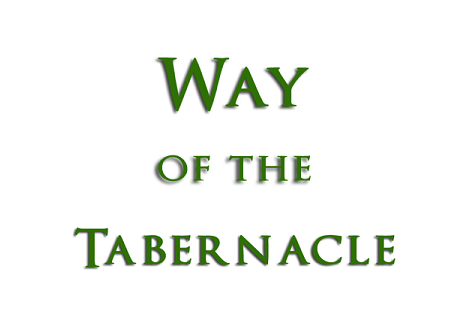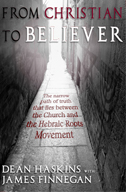dO sINNERS gO TO hEAVEN?
The true traditions of Yah have been all but lost on most in the church. They are virtually unknown, and those who do have some limited knowledge of them usually fail to apply them properly in a practical sense. Observing His traditions is a choice to identify with Him; moreover, by teaching them, it is less likely for false doctrines to be birthed.
As we will see, there are foundations of the faith other than just Yah's Sabbaths that reveal spiritual details by way of foreshadow. Throughout scripture there are references to the marriage of Christ to His bride. Many people don't realize that, where that wedding is concerned, every intricate detail of the ancient Jewish wedding traditions have been, and will be, followed explicitly.
There is also a wealth of spiritual knowledge that can be gleaned from the Temple Ordinances and Practices in the Talmud. Of course, those writings that were penned by the Jewish priests are not scripture, but they provide greater insight into many passages throughout the scriptures. The daily activities of the priests were highly complex, and the same Spirit who gave the law to Moses administered the priest's functions and duties.
Both the temple and the priests were symbols of the bride.
What? know ye not that your body is the temple of the Holy Ghost which is in you, which ye have of God, and ye are not your own? 1 Corinthians 6:19
But ye are a chosen generation, a royal priesthood, an holy nation, a peculiar people; that ye should shew forth the praises of him who hath called you out of darkness into his marvelous light: 1 Peter 2:9
The temple is a fascinating foreshadow, as it is a foreshadow of a foreshadow. The physical temple was a foreshadow of the bride, who is on earth. But, ultimately, the physical (earthly) bride is a foreshadow of the heavenly temple, and that temple is actually the spiritual bride (Revelation 21). The kingdom of Yah (kingdom of God) on earth is the bride, who is indwelt by the Holy Spirit (Neither shall they say, Lo here! or, lo there! for, behold, the kingdom of Yah is within you. Luke 17:21), and the kingdom of Yah in heaven is the bride—which is the New Jerusalem, or heavenly temple.
When Christ prayed, “Thy kingdom come, Thy will be done on earth as it is in heaven” (Matthew 6:10), He was speaking of His Father's kingdom, and that specific prayer was fulfilled in Acts 2 with the institution of the earthly bride of Messiah (the pouring out of the Holy Spirit onto all mankind).
Now, because this particular foundation of the faith is not widely understood, many theological errors have been promulgated concerning who will go to heaven, and who will not.
Now the deeds of the flesh are evident, which are: immorality, impurity, sensuality, idolatry, sorcery, enmities, strife, jealousy, outbursts of anger, disputes, dissensions, factions, envying, drunkenness, carousing, and things like these, of which I forewarn you, just as I have forewarned you, that those who practice such things will not inherit the kingdom of heaven. Galatians 5:19-21
Can you spot the error contained in this passage? Based on much of the “preaching” you've likely heard your whole life, you might not see any problem here. Most of us have heard the impassioned “fire and brimstone” preacher proclaiming that someone who [insert a sin by which you are not personally characterized here] will not go to heaven, so it is incumbent upon that person to “get his life right,” just in case he is [insert method of horrible death here] on his way home from the church.
So, where is the error in the above passage of scripture?
The Bible actually teaches us that “those who practice such things will not inherit the kingdom of Yah,” and that is not the same as the kingdom of heaven. However, if one falsely claims they are identical, then he immediately has the power to judge and condemn everyone who battles a particular sin of the flesh with which the self-appointed judge doesn't battle. Drunkards—that's a big one. Have you ever heard that “drunkards won't go to heaven”? How about homosexuals? Because of how we have been falsely taught, most would agree that there “won't be no queers in heaven,” right? Don't you just love to have that kind of eternal power over others?
But wait, if that's true about those vile winos and homosexuals, what about those with a temper? Well, usually that's rationalized as “righteous anger.” But, have you ever had an impure thought? Has there ever been strife between you and someone at your church, or your next-door neighbor? Those are usually just deflected with an “I'm human” rationalization, with the “real sinners” being those who defy what “good Christians” know is the way we're supposed to live. Of course, “keeping up with the Joneses” (envy) is the American way, after all.
This is the gross error of not understanding the difference between the kingdom of heaven and the kingdom of Yah, and it has produced a “gospel” that stands in direct opposition to the Spirit of Christ.
The Kingdom of Heaven
Everyone who possesses the Holy Spirit is part of the kingdom of heaven. Romans 8:9 teaches us that “. . . if anyone does not have the Spirit of Christ, he does not belong to Him.” Salvation is an eternal judicial decree of adoption by Yah. It is not based on works of righteousness or unrighteousness that anyone does, but solely on the grace of the Almighty. The proper response to the Holy Spirit's singular message to a lost person—that he is dead and in need of the life that comes only from the Messiah Yahoshua—is the belief necessary for salvation; and, as we're told, those who believe (the Spirit's wooing message) will be saved. According to Romans 8:9, that ultimately means to “have the Spirit of Christ,” which is spiritual life.
To further drive home that truth, John 3:18 tells us, “He that believeth in Him is not condemned; but He that believeth not is condemned already, because he hath not believed in the name of the only begotten Son of Yah.” So, if one is “condemned already” for his unbelief, there is no way for that person to become “more condemned” through any act of unrighteousness.
The symbolism of the menorah is deeply rich, as it represents us—living and breathing people. An unbeliever is represented by a menorah that is not lit, which, by definition, is useless—dead. At the moment of justification, the menorah's center stick is eternally lit, with the fire representing the Holy Spirit. In the temple menorah, the center stick, which is lit only by the high priest, had a reservoir that was continually replenished with oil to keep it from ever being extinguished. The fire from the oil in the center stick was used to light the remaining six sticks.
The point is, one who possesses the Holy Spirit is saved as a non-negotiable legal act decreed by the Judge of judges. No human has the authority to override such a judicial act. So, in essence, when that emotion-fueled preacher pronounces that certain people who do certain things that personally offend his “sensibilities” will not go to heaven, he is proclaiming a judgment that supposedly negates the authority of the Most High; and, therefore, makes himself a liar—which, immediately sets him at odds with the law that he preaches.
The Messiah says in Matthew 12:31, "Therefore I tell you, every sin and blasphemy will be forgiven people, but the blasphemy against the Spirit will not be forgiven.” Notice that He didn't say that every sin “can be” forgiven people, but “will be.” He also did not say that any sin shall be forgiven “some people,” but “people.” So, being a person is the only condition He places on that forgiveness. And, in this verse, Messiah is speaking of sin in regards to salvation—obtaining heaven. But, “blaspheming against the Spirit,” or denying the only message He will ever give a lost person (that he is dead and needs life through belief in the Messiah), shall not be forgiven. In other words, “He that believeth not is condemned already.”
Whenever issues of sin and repentance are taught in the New Testament, it is necessary to understand what sin is being discussed. If the sin pertains to salvation, it can be only one thing: unbelief. The only sin for which a lost person must repent is his unbelief.
The Kingdom of Yah
So, if all who believe in Yahoshua the Messiah, and are thus indwelt by the Holy Spirit, will be in heaven, why does the Bible teach us that those who are characterized by living in their flesh (those sins listed in Galatians 5) will not inherit the kingdom of Yah? It's because they won't.
This is the difference between one who is righteous and one who is holy. To be declared righteous is something that only Yah can do, as it is a legal decree; however, to be holy is the believer's responsibility. That is why Yah tells us, “Be holy, for I am holy” (1 Peter 1:16). If our holiness were Yah's responsibility, He wouldn't tell us to do it.
Here is a foreshadow that is painted for believers in the Temple Ordinances and Practices. In the Jewish temple, those of the priesthood were required to go through a ten-year period of testing from the age of 20 to 30. Those whose moral character was deemed worthy at the end of the testing period had their names placed in a book located within the sanctuary, while those who failed the test because of some moral defect or character flaw were merely listed in the book outside the sanctuary, which contained the names of all priests. Only those whose names appeared in the book inside the sanctuary were allowed entry, and those whose names were only listed in the book outside the sanctuary performed their priestly duties outside the gates.
Those two books symbolized the Book of Life (outside the sanctuary) and the Lamb's Book of Life (inside the sanctuary). Those who are allowed inside the gates of the sanctuary in the New Jerusalem of Revelation 21 experience the glory of Yah firsthand, and then share that glory with those who do not have access to it.
What kind of people are outside the gates of New Jerusalem's sanctuary? They are described in Revelation 22, which occurs after the devil, his demons, and the unbelievers are cast into the lake of fire (Revelation 20:15). And, we're told, “Blessed are those who wash their robes (a temple ordinance), so that they may have the right to the tree of life, and may enter by the gates into the city. Outside are the dogs and the sorcerers and the immoral persons and the murderers and the idolaters, and everyone who loves and practices lying.” This precisely describes the temple practices explained above.
The Menorah
The menorah, which we've briefly discussed, continues to be of vital importance here. As explained, the center stick of the menorah is lit through Yah's Son, the Great High Priest, and signifies the presence of the Holy Spirit. Remember, the fire of that center stick is what is used to light the other six sticks, but the act of lighting the other six sticks is the responsibility of the believer.
What does the Holy Spirit do in the life of the believer? He instructs us in the will of Yah, in other words, He tells us to do what our heavenly Father desires us to do. And, according to the language of the New Testament, what are those instructions of the Holy Spirit called? They are the “commandments of Yah.” So, those who do the commandments of Yah are those who heed the instructions given to them by the Holy Spirit (the fulfilled Law of Yah).
And, what is it that Yah desires us to do? We are told in scripture to deny, or crucify, our flesh, so that is what the Holy Spirit will lead us to do. The center stick of the temple menorah burns olive oil, which symbolizes the Holy Spirit. To obtain more oil, the flesh of olives must be crushed, which is the process of crucifying, or denying, one's own flesh. That oil is what is poured into the bowls atop the remaining six sticks. The more oil one has (the more one crucifies his flesh), the more sticks of his menorah will be lit—signifying the level to which the Holy Spirit has been given control of the person's life.
Those whose center stick is the only one with fire are those who have not crushed their flesh enough to obtain the necessary oil to light the others. If they've not crucified their flesh, they live according to their flesh, and not according to the Spirit. These are those who are described as “outside the gates” in Revelation 22.
The Four Types of People
Revelation 22:11 describes the four types of people who will be either in heaven or in hell: “He who is unjust, let him be unjust still; he who is filthy, let him be filthy still; he who is righteous, let him be righteous still; he who is holy, let him be holy still.” The first two types will be in hell, the second two will be in heaven.
The Unjust – these are those who, while they may have lived moral lives (good people), they were never justified by Yah. The rich young ruler in the Gospels is a good example.
The Filthy – these are those who are neither justified nor who possess what we would consider moral qualities. They are just downright evil. Adolph Hitler comes to mind here.
The Righteous – these are those who have been justified, adopted by Yah. They are children of the Most High, yet did not deny their flesh. They possess the minimum qualifications for their heavenly residence. They will not have access to the sanctuary in the temple.
The Holy – these are those who have been justified by Yah, and who also allowed the Holy Spirit to lead them into sanctification through the denying of their flesh. They will have access to the sanctuary, and thus, experience the glory of Yah firsthand.
In a sense, the filthy and the holy are the extremes of the unjust and the righteous.
Those who have the Holy Spirit, which is something that cannot be earned or lost through any works of man, will be in the kingdom of heaven. Those who yield their lives to the Holy Spirit by denying their flesh will inherit the kingdom of Yah, which simply means to have access to the sanctuary within the temple—the sanctuary in which Yah will eternally dwell, or the eternal Holy of Holies.
So, the next time somebody tells you that [drunks, adulterers, fornicators, homosexuals, etc.] will not go to heaven, just tell him that, according to what he believes, neither will liars, so he'd better pray he's wrong.
Exerpted from "From Christian to Believer."

Written by Dean Haskins for Way of the Tabernacle. Reproductions with proper attribution are allowed and encouraged.
Salvation
Traditions
Other Truths
But now in Yahoshua the Messiah you who formerly were far off have been brought near by the blood of Christ. For He Himself is our peace, who made both groups into one and broke down the barrier of the dividing wall, by abolishing in His flesh the enmity, which is the Law of commandments contained in ordinances, so that in Himself He might make the two into one new man, thus establishing peace, and might reconcile them both in one body to Yah through the cross, by it having put to death the enmity. Ephesians 2:13-16




